- Home
- Nnedi Okorafor
Binti, The Complete Trilogy: Binti ; Home ; The Night Masquerade
Binti, The Complete Trilogy: Binti ; Home ; The Night Masquerade Read online
DAW Books proudly presents the novels of Nnedi Okorafor:
WHO FEARS DEATH
THE BOOK OF PHOENIX
BINTI: THE COMPLETE TRILOGY
Binti | Binti: Home | Binti: The Night Masquerade
with Binti: Sacred Fire
BINTI copyright © 2015 by Nnedi Okorafor.
BINTI: HOME copyright © 2017 by Nnedi Okorafor.
BINTI: THE NIGHT MASQUERADE copyright © 2018 by Nnedi Okorafor.
BINTI: SACRED FIRE copyright © 2019 by Nnedi Okorafor.
All Rights Reserved.
Jacket art by Greg Ruth.
Jacket design by Jim Tierney.
Book designed by Fine Design.
DAW Book Collectors No. 1813.
Published by DAW Books, Inc.
1745 Broadway, New York, NY 10019.
All characters and events in this book are fictitious.
Any resemblance to persons living or dead is strictly coincidental.
The scanning, uploading, and distribution of this book via the Internet or via any other means without the permission of the publisher is illegal, and punishable by law. Please purchase only authorized electronic editions, and do not participate in or encourage the electronic piracy of copyrighted materials. Your support of the author’s rights is appreciated.
Nearly all the designs and trade names in this book are registered trademarks. All that are still in commercial use are protected by United States and international trademark law.
Ebook ISBN: 9780756415198
DAW TRADEMARK REGISTERED
U.S. PAT. AND TM. OFF. AND FOREIGN COUNTRIES
—MARCA REGISTRADA
HECHO EN U.S.A.
PRINTED IN THE U.S.A.
Version_1
CONTENTS
Also by Nnedi Okorafor
Title Page
Copyright
BintiDedication
Binti: Sacred FireDedication
Binti: HomeHumans. Always Performing
Launch
At Home
The Root
Night Masquerade
Blood
Hinterland
Destiny Is a Delicate Dance
Lies
Gold People
The Ariya
Initiative
Binti: The Night MasqueradeChapter 1: Aliens
Chapter 2: Orange
Chapter 3: When Elephants Fight
Chapter 4: Homecoming
Chapter 5: Homegoing
Chapter 6: Girl
Chapter 7: The Root
Chapter 8: Space Is the Place
Chapter 9: Awake
Chapter 10: Stones of Saturn
Chapter 11: Ntu Ntu Bugs and Sunshine
Chapter 12: President Haras
Chapter 13: Medical
Chapter 14: Shape Shifter
Acknowledgments
About the Author
Dedicated to the little blue jellyfish I saw swimming the Khalid Lagoon that sunny day in Sharjah, United Arab Emirates
I powered up the transporter and said a silent prayer. I had no idea what I was going to do if it didn’t work. My transporter was cheap, so even a droplet of moisture, or more likely, a grain of sand, would cause it to short. It was faulty and most of the time I had to restart it over and over before it worked. Please not now, please not now, I thought.
The transporter shivered in the sand and I held my breath. Tiny, flat, and black as a prayer stone, it buzzed softly and then slowly rose from the sand. Finally, it produced the baggage-lifting force. I grinned. Now I could make it to the shuttle. I swiped otjize from my forehead with my index finger and knelt down. Then I touched the finger to the sand, grounding the sweet smelling red clay into it. “Thank you,” I whispered. It was a half-mile walk along the dark desert road. With the transporter working, I would make it there on time.
Straightening up, I paused and shut my eyes. Now the weight of my entire life was pressing on my shoulders. I was defying the most traditional part of myself for the first time in my entire life. I was leaving in the dead of night and they had no clue. My nine siblings, all older than me except for my younger sister and brother, would never see this coming. My parents would never imagine I’d do such a thing in a million years. By the time they all realized what I’d done and where I was going, I’d have left the planet. In my absence, my parents would growl to each other that I was to never set foot in their home again. My four aunties and two uncles who lived down the road would shout and gossip among themselves about how I’d scandalized our entire bloodline. I was going to be a pariah.
“Go,” I softly whispered to the transporter, stamping my foot. The thin metal rings I wore around each ankle jingled noisily, but I stamped my foot again. Once on, the transporter worked best when I didn’t touch it. “Go,” I said again, sweat forming on my brow. When nothing moved, I chanced giving the two large suitcases sitting atop the force field a shove. They moved smoothly and I breathed another sigh of relief. At least some luck was on my side.
* * *
Fifteen minutes later I purchased a ticket and boarded the shuttle. The sun was barely beginning to peak over the horizon. As I moved past seated passengers far too aware of the bushy ends of my plaited hair softly slapping people in the face, I cast my eyes to the floor. Our hair is thick and mine has always been very thick. My old auntie liked to call it “ododo” because it grew wild and dense like ododo grass. Just before leaving, I’d rolled my plaited hair with fresh sweet-smelling otjize I’d made specifically for this trip. Who knew what I looked like to these people who didn’t know my people so well.
A woman leaned away from me as I passed, her face pinched as if she smelled something foul. “Sorry,” I whispered, watching my feet and trying to ignore the stares of almost everyone in the shuttle. Still, I couldn’t help glancing around. Two girls who might have been a few years older than me, covered their mouths with hands so pale that they looked untouched by the sun. Everyone looked as if the sun was his or her enemy. I was the only Himba on the shuttle. I quickly found and moved to a seat.
The shuttle was one of the new sleek models that looked like the bullets my teachers used to calculate ballistic coefficients during my A-levels when I was growing up. These ones glided fast over land using a combination of air current, magnetic fields, and exponential energy—an easy craft to build if you had the equipment and the time. It was also a nice vehicle for hot desert terrain where the roads leading out of town were terribly maintained. My people didn’t like to leave the homeland. I sat in the back so I could look out the large window.
I could see the lights from my father’s astrolabe shop and the sand storm analyzer my brother had built at the top of the Root—that’s what we called my parents’ big, big house. Six generations of my family had lived there. It was the oldest house in my village, maybe the oldest in the city. It was made of stone and concrete, cool in the night, hot in the day. And it was patched with solar planes and covered with bioluminescent plants that liked to stop glowing just before sunrise. My bedroom was at the top of the house. The shuttle began to move and I stared until I couldn’t see it anymore. “What am I doing
?” I whispered.
An hour and a half later, the shuttle arrived at the launch port. I was the last off, which was good because the sight of the launch port overwhelmed me so much that all I could do for several moments was stand there. I was wearing a long red skirt, one that was silky like water, a light orange wind-top that was stiff and durable, thin leather sandals, and my anklets. No one around me wore such an outfit. All I saw were light flowing garments and veils; not one woman’s ankles were exposed, let alone jingling with steel anklets. I breathed through my mouth and felt my face grow hot.
“Stupid stupid stupid,” I whispered. We Himba don’t travel. We stay put. Our ancestral land is life; move away from it and you diminish. We even cover our bodies with it. Otjize is red land. Here in the launch port, most were Khoush and a few other non-Himba. Here, I was an outsider; I was outside. “What was I thinking?” I whispered.
I was sixteen years old and had never been beyond my city, let alone near a launch station. I was by myself and I had just left my family. My prospects of marriage had been 100 percent and now they would be zero. No man wanted a woman who’d run away. However, beyond my prospects of normal life being ruined, I had scored so high on the planetary exams in mathematics that the Oomza University had not only admitted me, but promised to pay for whatever I needed in order to attend. No matter what choice I made, I was never going to have a normal life, really.
I looked around and immediately knew what to do next. I walked to the help desk.
* * *
The travel security officer scanned my astrolabe, a full deep scan. Dizzy with shock, I shut my eyes and breathed through my mouth to steady myself. Just to leave the planet, I had to give them access to my entire life—me, my family, and all forecasts of my future. I stood there, frozen, hearing my mother’s voice in my head. “There is a reason why our people do not go to that university. Oomza Uni wants you for its own gain, Binti. You go to that school and you become its slave.” I couldn’t help but contemplate the possible truth in her words. I hadn’t even gotten there yet and already I’d given them my life. I wanted to ask the officer if he did this for everyone, but I was afraid now that he’d done it. They could do anything to me, at this point. Best not to make trouble.
When the officer handed me my astrolabe, I resisted the urge to snatch it back. He was an old Khoush man, so old that he was privileged to wear the blackest turban and face veil. His shaky hands were so gnarled and arthritic that he nearly dropped my astrolabe. He was bent like a dying palm tree and when he’d said, “You have never traveled; I must do a full scan. Remain where you are,” his voice was drier than the red desert outside my city. But he read my astrolabe as fast as my father, which both impressed and scared me. He’d coaxed it open by whispering a few choice equations and his suddenly steady hands worked the dials as if they were his own.
When he finished, he looked up at me with his light green piercing eyes that seemed to see deeper into me than his scan of my astrolabe. There were people behind me and I was aware of their whispers, soft laughter and a young child murmuring. It was cool in the terminal, but I felt the heat of social pressure. My temples ached and my feet tingled.
“Congratulations,” he said to me in his parched voice, holding out my astrolabe.
I frowned at him, confused. “What for?”
“You are the pride of your people, child,” he said, looking me in the eye. Then he smiled broadly and patted my shoulder. He’d just seen my entire life. He knew of my admission into Oomza Uni.
“Oh.” My eyes pricked with tears. “Thank you, sir,” I said, hoarsely, as I took my astrolabe.
I quickly made my way through the many people in the terminal, too aware of their closeness. I considered finding a lavatory and applying more otjize to my skin and tying my hair back, but instead I kept moving. Most of the people in the busy terminal wore the black and white garments of the Khoush people—the women draped in white with multicolored belts and veils and the men draped in black like powerful spirits. I had seen plenty of them on television and here and there in my city, but never had I been in a sea of Khoush. This was the rest of the world and I was finally in it.
As I stood in line for boarding security, I felt a tug at my hair. I turned around and met the eyes of a group of Khoush women. They were all staring at me; everyone behind me was staring at me.
The woman who’d tugged my plait was looking at her fingers and rubbing them together, frowning. Her fingertips were orange red with my otjize. She sniffed them. “It smells like jasmine flowers,” she said to the woman on her left, surprised.
“Not shit?” one woman said. “I hear it smells like shit because it is shit.”
“No, definitely jasmine flowers. It is thick like shit, though.”
“Is her hair even real?” another woman asked the woman rubbing her fingers.
“I don’t know.”
“These ‘dirt bathers’ are a filthy people,” the first woman muttered.
I just turned back around, my shoulders hunched. My mother had counseled me to be quiet around Khoush. My father told me that when he was around Khoush merchants when they came to our city to buy astrolabes, he tried to make himself as small as possible. “It is either that or I will start a war with them that I will finish,” he said. My father didn’t believe in war. He said war was evil, but if it came he would revel in it like sand in a storm. Then he’d say a little prayer to the Seven to keep war away and then another prayer to seal his words.
I pulled my plaits to my front and touched the edan in my pocket. I let my mind focus on it, its strange language, its strange metal, its strange feel. I’d found the edan eight years ago while exploring the sands of the hinter deserts one late afternoon. “Edan” was a general name for a device too old for anyone to know it functions, so old that they were now just art.
My edan was more interesting than any book, than any new astrolabe design I made in my father’s shop that these women would probably kill each other to buy. And it was mine, in my pocket, and these nosy women behind me could never know. Those women talked about me, the men probably did too. But none of them knew what I had, where I was going, who I was. Let them gossip and judge. Thankfully, they knew not to touch my hair again. I don’t like war either.
The security guard scowled when I stepped forward. Behind him I could see three entrances, the one in the middle led into the ship called “Third Fish,” the ship I was to take to Oomza Uni. Its open door was large and round leading into a long corridor illuminated by soft blue lights.
“Step forward,” the guard said. He wore the uniform of all launch site lower-level personnel—a long white gown and gray gloves. I’d only seen this uniform in streaming stories and books and I wanted to giggle, despite myself. He looked ridiculous. I stepped forward and everything went red and warm.
When the body scan beeped its completion, the security guard reached right into my left pocket and brought out my edan. He held it to his face with a deep scowl.
I waited. What would he know?
He was inspecting its stellated cube shape, pressing its many points with his finger and eyeing the strange symbols on it that I had spent two years unsuccessfully trying to decode. He held it to his face to better see the intricate loops and swirls of blue and black and white, so much like the lace placed on the heads of young girls when they turn eleven and go through their eleventh-year rite.
“What is this made of?” the guard asked, holding it over a scanner. “It’s not reading as any known metal.”
I shrugged, too aware of the people behind me waiting in line and staring at me. To them, I was probably like one of the people who lived in caves deep in the hinter desert who were so blackened by the sun that they looked like walking shadows. I’m not proud to say that I have some Desert People blood in me from my father’s side of the family, that’s where my dark skin and extra-bushy hair come from.
&
nbsp; “Your identity reads that you’re a harmonizer, a masterful one who builds some of the finest astrolabes,” he said. “But this object isn’t an astrolabe. Did you build it? And how can you build something and not know what it’s made of?”
“I didn’t build it,” I said.
“Who did?”
“It’s . . . it’s just an old, old thing,” I said. “It has no math or current. It’s just an inert computative apparatus that I carry for good luck.” This was partially a lie. But even I didn’t know exactly what it could and couldn’t do.
The man looked as if he would ask more, but didn’t. Inside, I smiled. Government security guards were only educated up to age ten, yet because of their jobs, they were used to ordering people around. And they especially looked down on people like me. Apparently, they were the same everywhere, no matter the tribe. He had no idea what a “computative apparatus” was, but he didn’t want to show that I, a poor Himba girl, was more educated than he. Not in front of all these people. So he quickly moved me along and, finally, there I stood at my ship’s entrance.
I couldn’t see the end of the corridor, so I stared at the entrance. The ship was a magnificent piece of living technology. Third Fish was a Miri 12, a type of ship closely related to a shrimp. Miri 12s were stable calm creatures with natural exoskeletons that could withstand the harshness of space. They were genetically enhanced to grow three breathing chambers within their bodies.
Scientists planted rapidly growing plants within these three enormous rooms that not only produced oxygen from the CO2 directed in from other parts of the ship, but also absorbed benzene, formaldehyde, and trichloroethylene. This was some of the most amazing technology I’d ever read about. Once settled on the ship, I was determined to convince someone to let me see one of these amazing rooms. But at the moment, I wasn’t thinking about the technology of the ship. I was on the threshold now, between home and my future.

 Binti, The Complete Trilogy: Binti ; Home ; The Night Masquerade
Binti, The Complete Trilogy: Binti ; Home ; The Night Masquerade Remote Control
Remote Control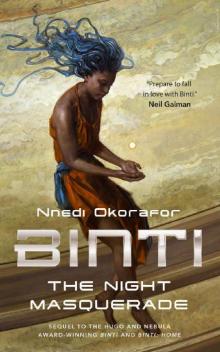 Binti: The Night Masquerade
Binti: The Night Masquerade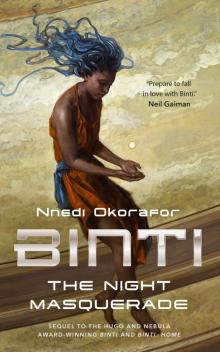 Binti--The Night Masquerade
Binti--The Night Masquerade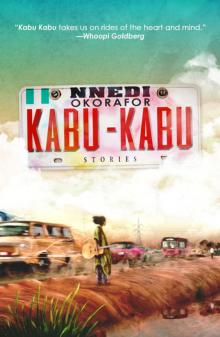 Kabu Kabu
Kabu Kabu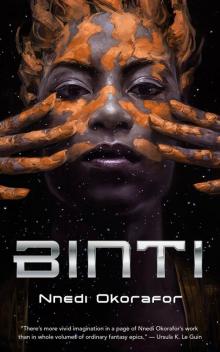 Binti
Binti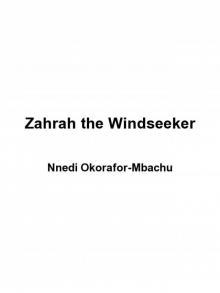 Zahrah the Windseeker
Zahrah the Windseeker Akata Witch: A Novel
Akata Witch: A Novel Ikenga
Ikenga Who Fears Death
Who Fears Death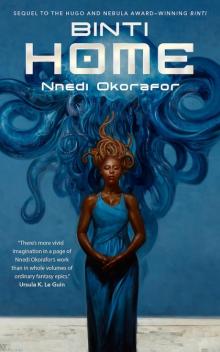 Binti--Home
Binti--Home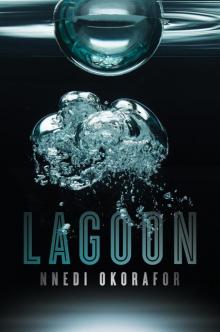 Lagoon
Lagoon Akata Witch
Akata Witch The Book of Phoenix
The Book of Phoenix Akata Warrior
Akata Warrior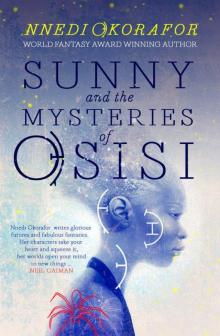 Sunny and the Mysteries of Osisi
Sunny and the Mysteries of Osisi